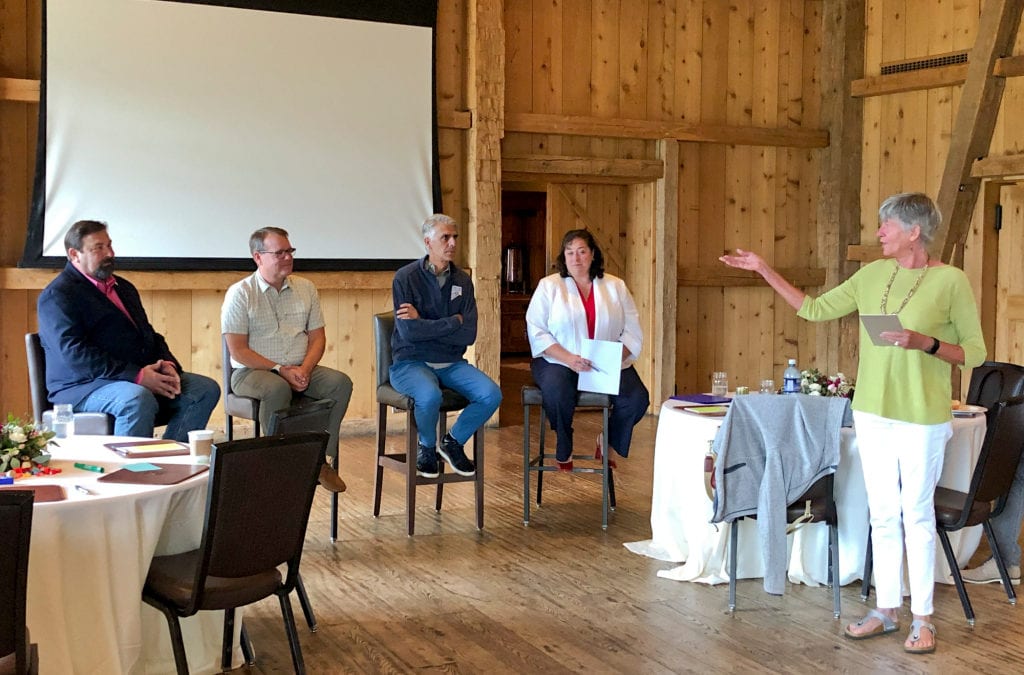TABERNASH — Colorado higher education leaders joined the University of Colorado Board of Regents’ retreat on Wednesday to discuss the future of higher education and how CU’s next president can play a part.
Colorado State University Chancellor Tony Frank, University of Northern Colorado President Andy Feinstein and Fort Lewis College President Tom Stritikus formed a panel in the Broad Axe Barn at Devil’s Thumb Ranch in Tabernash.
The CU regents’ three-day retreat focused on the search for the next president, and regents and system leaders asked Frank, Feinstein and Stritikus to weigh in on the role of CU’s president in Colorado higher education and the perception of CU across the country.
Feinstein, who has worked for both elected and appointed governing boards, said working with elected regents is more complex because of differing views and conflicts of opinion that need to be addressed.
“From an outside viewpoint, looking at the conflict that has occurred on this board and the way in which (former President) Mark Kennedy was engaged — that was very concerning to me,” Feinstein said. “I don’t know the intricacies of the way you worked together but it certainly gave me pause and concern.”
That’s why the university presidents were there, Feinstein said, to help in any way they can and to clarify what the role of CU’s president means to other institutions and the state.
Kennedy’s tenure and departure is something a search firm could address with candidates, Frank said.
“You will have a chance to explain that and you should look for that in your search firm, someone who can say to candidates, ‘This isn’t what it appears to be from the outside, a political appointee role by whoever is in charge of the board, that the regents do share common values,” Frank said.
CU is a prestigious institution with distinct campuses serving important missions, Frank said, and is part of if not the cornerstone of Colorado’s education system.
But there’s also a perception that CU mainly serves the Front Range, as opposed to the state as a whole, and that CU Boulder is more interested in nonresident students, Frank said.
Both Feinstein and Frank said they would not consider applying for a job unless the search resulted in a sole finalist.
“In my current state as a sitting president, I would not apply to a role that’s a public search. I would fear for my position as a sitting president,” Feinstein said.
Frank added that being named as a finalist for another job could harm the momentum at the candidate’s current institution.
“As you’re trying to convince people that this is worth investing in with your time and energy, and then you’re suddenly not sure if you’re going to be here — that’s a tough message to pull off, which is why I think you see so many sole finalists nationally,” Frank said.
Naming a sole finalist does add pressure to the search process, to the level of trust in the organization, to the search committee and to the Board of Regents, he said.
But on the other end, naming multiple candidates can result in gamesmanship — for example, releasing the name of a sitting president who is typically hired and then the names of other finalists from very different institutions to fill in the other spots.
“That’s not advancing the process of an open and transparent search,” Frank said. “That’s just a way around it.”
Feinstein also added he would not want to be hired on a split vote of a governing board, which was the case with Kennedy. The Board of Regents approved Kennedy’s hiring on a 5-4 party-line vote, with Republicans voting in favor and Democrats voting against.
“I’d have a very tough time saying yes to a board that was split on my leadership,” Feinstein said.
CU’s next president also has the ability to be a leader of increasing collaborations among Colorado’s higher education institutions, the panelists said.
Interim CU President Todd Saliman said he recently has seen institutions collaborate more than he has in 25 years in the higher education ecosystem, but acknowledged that it is still tenuous.
“There’s an expectation that we work together, but the powers that be sometimes present things in a way that it’s difficult to work together and pits us against each other,” Saliman said.
The state’s funding model for higher education — institutions pitching to lawmakers why they need money — is in itself an act of “carving up the pie” rather than talking about the important role each college and university plays, Frank said.
“It becomes this false choice of what matters more to you, the research done at CU Boulder or the first generation kid that came from an intercity school that might be going to (Metropolitan State University of Denver,)” Frank said. “We should reject that choice every day of the week and twice on Sundays.”
CU’s next leader also needs to be able to communicate the value of higher education, panelists said.
While higher education institutions are delivering on their missions, Frank said, they are failing to convince the public of that fact.
“I think one of the most important things for you all as you hire this position is we all want a partner to stand up on that stage and help with that message, maybe in ways we haven’t figured out yet,” he said.
This content was originally published here.

